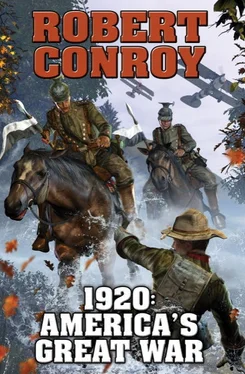“They didn’t,” said the crown prince. “We’ve had word that the British were working on something similar for the last couple of years. We’ve never given it much credence, nor did we think it would be such a devastating weapon.”
“Now what, sir?”
Wilhelm grimaced. “Distasteful as it might be, a withdrawal is the wisest course. We will wait for resupply and reinforcements. Our army must rest and regain its collective courage. I doubt very much if God himself could make our men charge the American defenses again, especially as they are being reinforced as we speak. Who knows,” he laughed harshly, “the emperor might just decide to call off this entire endeavor.”
Mackensen was about to ask just what future plans the prince had when a look of surprise appeared for just an instant on the prince’s face before the front of his skull exploded, sending bone and bloody matter into the air. Some of it landed on Mackensen who, along with others, dropped to the ground.
“Sniper!” someone screamed. Of course it was a sniper, Mackensen thought. He reached for the hand of his prince and moaned. The prince’s skull was a vacant mess. The heir to Kaiser Wilhelm II was well and truly dead.
* * *
A few hundred yards away, Reggie Carville hummed softly as he wrapped his beloved and disassembled rifle in what he hoped was a waterproof tarpaulin and buried it in the ground. He’d already wiped off his fingerprints, not that anybody would think of using that still fairly new crime-fighting technology on a battlefield. With a little bit of luck he’d be able to retrieve it in a few days when the Germans had evacuated the area. The rifle was a German Gehwehr 88, called by some a Mauser but was really more of a Mannlicher. Regardless, it was a German weapon and, if found, would confuse the finders.
Carville had owned it for several years and had it modified into a highly accurate sporting rifle with a telescopic sight. He had brought it, disassembled, in his suitcase.
The German headquarters was a beehive of panicked activity. No one seemed much in control and patrols were going in all directions searching for the sniper.
When he had the chance, he would tell his good friend, Sergeant “Smeeth,” about his good shooting. “Smeeth” would be so jealous.
Reggie stood and brushed the dirt from his clothing. A German major ran up to him, his Luger in his hand. Reggie was unarmed and in civilian clothing. He smiled and held his hands out to show he was harmless.
“What are you doing here?” the German asked.
“I am a reporter and here are my credentials,” Reggie said firmly. “And kindly note they’ve been signed by the kaiser himself.” And outstanding forgeries they were, he thought. “Has something happened to the crown prince?”
“The late crown prince,” the German said angrily. “A sniper killed him.”
“Good God!”
“So, did you see any suspicious activity? As in someone running away and carrying a rifle?”
“I don’t meant to sound sarcastic, Major, but I’ve seen a great many men running with rifles. Although, I do seem to recall a man in a German uniform running north, rather than south and west along with the rest of the army.”
The major sagged and Reggie could read his mind. Could the murderer have been a German soldier? A communist or anarchist, or just someone who thought the California venture was a bloody waste of lives?
The major departed to continue his fruitless search. Reggie found a comfortable place to sit and wait for the Germans to leave and the Americans to arrive.
Ah, Reggie thought happily, he had indeed crowned the prince.
 EPILOG
EPILOG 
Robert Lansing, President of the United States, looked over the latest report from California. It had been two months since the surrender of the German Army at the small port of Monterey, on the Pacific coast and south of San Francisco. The Germans had been besieged for three months. They had been left stranded when Admiral von Trotha, replacing the seriously wounded Hipper, decided to withdraw the remains of his fleet to Cam Ranh Bay for refit and repair. This had become necessary when the German Navy realized that Los Angeles facilities had all been damaged and were in danger of falling to fast-moving American columns under General Pershing. A spearhead under Lejeune had moved quickly and taken up position in the hills overlooking Los Angeles.
Trotha had been more than a little spooked by the presence of the British fleet, which trailed him and threatened his few ships with annihilation. The threat was never spoken, but it was understood nonetheless.
San Diego had fallen earlier to Lejeune’s mounted columns. Pershing might have been in overall command of the southern wing, but the American public was cheering the exploits of John Lejeune, pride of the United States Marine Corps. Liggett and Sims were also national heroes.
Mrs. Tuttle knocked and opened the door to the president’s office. She was radiant. She had just found out that her young cousin, Luke Martel, had not only survived the fighting but had been promoted and decorated. He was resigning his commission as an officer and would go into civilian life as a hero. He’d received his second Medal of Honor for capturing von Hutier, and Douglas MacArthur had also been given the same medal for leading the insane charge that had broken the German attack. Luke had gotten married and would soon be a father. Lansing was curious about the timing of all that, but he was far too much of a gentleman to comment. The happy couple would stay in southern California, apparently making babies, growing grapes, and making wine. Mrs. Tuttle was already planning a visit.
“Sir, the British are here and it’s that silly Mr. Churchill.”
“Thank you, Mrs. Tuttle,” Lansing said, fervently hoping that the silly Mr. Churchill hadn’t heard the comment. Apparently he had. He glared at her as she departed.
Lansing sighed. He didn’t much like Churchill either. Just a tad overbearing, even for a Brit.
“I have excellent news, Mr. Lansing. It appears that the Kaiser will abdicate in favor of his second son and will declare for a constitutional monarchy. The defeat in California was too much for the German public to stomach.”
With Crown Prince Wilhelm dead from a sniper’s bullet, the next in line was Prince Eitel Fredrich, age thirty-seven. He was an unknown quantity save for rumors of corruption. Apparently the kaiser-to-be was susceptible to bribes. Lansing wondered if the rumors of a British sniper killing the younger Wilhelm were true. The Brits solemnly denied it.
Kaiser Wilhelm II had been devastated by the loss of his oldest son. Lansing found it hard to find sympathy for the man who had ordered the invasion of the United States and who had participated in the destruction of Belgium and France in 1914.
Churchill continued. “The overall German military position has been seriously compromised. She lost nearly half her main battle fleet at San Francisco, and I understand that your people are taking great advantage of that.”
Lansing smiled. “Indeed.” It was no secret. The Bayern and Arizona had been refloated and were being repaired. The Bayern would be added to the American Navy, as would at least two other fairly modern but badly damaged German capital ships. Sadly, the Nevada had sunk in deep water and would remain there.
“Kaiser Wilhelm wants his army back,” Churchill said with a grin.
Lansing smiled tolerantly. “And he shall have it once he agrees to pay indemnity for all the damage Germany caused. Constitutional monarchy or not, the new German government cannot hold themselves blameless for their kaiser’s actions. The military and the aristocracy, along with the average German, indulged in Wilhelm the Second’s insane desires for a German empire.”
Читать дальше

 EPILOG
EPILOG 










